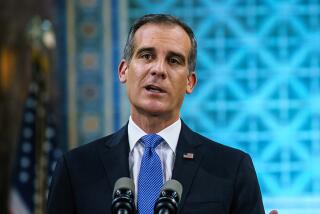Saudis’ Longtime Envoy to the U.S. Resigns
- Share via
WASHINGTON — Prince Bandar bin Sultan, who as Saudi Arabia’s ambassador to the United States has been a power player here for 22 years, has resigned his post for personal reasons, the Saudi government announced Wednesday.
The flamboyant former fighter pilot will be succeeded by Prince Turki al Faisal, a former Saudi intelligence chief and the current ambassador to Britain, the government said.
Bandar’s resignation, which had been rumored for weeks, comes as broader changes are expected soon in the government of the world’s largest oil-producing nation. King Fahd’s long illness is apparently growing more serious, and when he dies, Crown Prince Abdullah, the de facto ruler for the last decade, is expected to organize a new government.
There has been speculation that Bandar, 56, the son of Defense Minister Prince Sultan ibn Abdulaziz, hopes to become minister of intelligence in the reshuffle. Bandar is reported to have tired of his diplomatic post and is believed to have spent little time in Washington in recent months. There have also been reports that he is ailing.
The Saudi Embassy in Washington released a statement from the Foreign Ministry in Riyadh praising Bandar’s “exceptional gifts” as a diplomat. It did not return calls seeking elaboration on the reason for his departure.
In a statement Wednesday, the White House cited Bandar’s “charm, wit and humor” and called him a “tireless advocate for close ties, warm relations and mutual understanding between the United States and Saudi Arabia over 20 years.”
Bandar is leaving at a time of significant issues between the United States and Saudi Arabia. The foremost may be the joint effort against Islamic extremism, said Rachel Bronson, director of Middle East studies at the Council on Foreign Relations.
Another is the war in Iraq, which the Saudi government considers a threat to its security. There is tension between the U.S. and Saudi governments over the regular flow of militants from the kingdom to Iraq, Bronson noted.
In addition, she said, the U.S. government has been encouraging the Saudis to make democratic reforms -- overtures that have not always been welcomed by the kingdom.
Bandar has been close to the Bush family for years, especially President George H.W. Bush, with whom he worked on the 1991 Persian Gulf War. Saudi Arabia was a significant strategic base for U.S. troops before, during and after the conflict.
But Bandar’s job became more stressful after the Sept. 11, 2001, terrorist attacks in the United States, as he tried to heal relations badly damaged by the fact that 15 of the 19 hijackers were Saudi citizens.
News reports in 2002 indicated that some charitable contributions from Bandar and his wife had ended up in the hands of two Saudis who gave money to two of the hijackers. Bandar’s wife, Princess Haifa al Faisal, has said the family wanted only to help people in need.
Bronson said she didn’t expect the change in ambassadors to bring a significant shift in policy.
But she said it would be beneficial for the United States to open a new chapter in its relationship with Turki, whose brother is the foreign minister and who has been closely engaged in the fight against Islamic extremism.
“It’s good news to have him coming,” she said.
Turki was Saudi intelligence chief for 24 years, leaving the post the month before the Sept. 11 attacks. He collaborated with U.S. officials in the 1980s when the two countries were helping Afghan mujahedin in their fight against the Soviet-backed government in Kabul.
Since becoming ambassador to Britain in November 2002, Turki has worked with British authorities to fight Islamic extremism in that country, Bronson said.
Turki could come under renewed criticism for his dealings with Osama bin Laden and the Al Qaeda terrorist network. He met with the Saudi-born Bin Laden several times, and critics contend that his relationship with the group is too close.
Adam Ereli, a State Department spokesman, said the U.S. government had no concerns about those contacts. “I think those issues have been dealt with,” he told reporters. “We’re looking forward to working with him.”
In Washington, Bandar was known as a bon vivant who enjoyed entertaining and wasn’t shy about displaying his wealth. Immaculately groomed, with glistening, manicured nails, he loved cigars and American products such as bluejeans and McDonald’s hamburgers.
The elder President Bush once wrote that Bandar was one of the few people allowed to smoke cigars in the family home.
But in recent years, Bandar has been less visible in Washington, and the role of the kingdom’s public emissary has been taken over by Adel Jubeir, foreign policy advisor to the crown prince.
More to Read
Sign up for Essential California
The most important California stories and recommendations in your inbox every morning.
You may occasionally receive promotional content from the Los Angeles Times.














